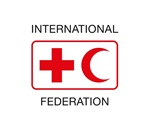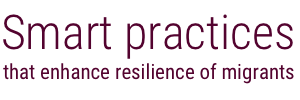Vocational training provided to asylum seekers in reception centres.
The Belgian Red Cross Training for Asylum Seekers Department designs, implements and provides training modules for asylum seekers in reception centers. These modules provide information on key concepts and aim to support and strengthen people’s skills. That will allow them to better face the challenges of the migratory journey they are engaged in. The most important topics discussed during training courses include autonomy, responsibility and the idea of “living together.” Upon completion, participants better understand the society around them and have a clearer view of their journey and opportunities that exist.
Modules are provided in French, Arabic, English, Russian, Pashto and Dari. This variety of languages is intended to maximize participation and meet a wide number of people’s needs.
Topics discussed during the trainings concern practical, professional and civic aspects of life in Belgium. Courses cover Health Care, Budgeting, Asylum Procedure, Life after Reception Centres, Vocational Orientation, and Belgium as a country (history, political institutions, and citizens’ rights).
Partnerships with ‘Promotion Sociale’ schools and other training organizations ensure access to literacy and French courses. Vocational trainings in carpentry, masonry, domestic and kitchen help are organized through similar partnerships.
In 2015, 700 people attended at least one module.
Design. [P1] Focuses on the need of asylum seekers to understand the system and be able to work. [P3] Supports the aspirations of asylum seekers to acquire skills to be able to work;
Implementation. [P5] Links awareness and advocacy for asylum seekers. [P6] Partnership with Le Ciré to deliver this programme.
- Changes in the user base – in the languages and origins of newcomers – often make it necessary to change courses and the languages they are taught in.
- Establishing partnerships and offering short vocational trainings and French courses which do not exceed the length of the asylum procedure.
- Disparities in participants’ level of education.
- It is important to move towards the recognition of training courses as part of the integration pathway; they are mandatory in Wallonia.
- It is important to obtain financial support to strengthen training progrmmes.
Smart practices
Smart practices report and database survey
About the report
People migrate in pursuit of a better life for themselves and their families. As described in the International Federation of Red Cross and Red Crescent Societies’ (IFRC) Policy on Migration, “migrants are persons who leave or flee their habitual residence to go to new places – usually abroad – to seek opportunities or safer and better prospects.
Read more
About the International Federation

